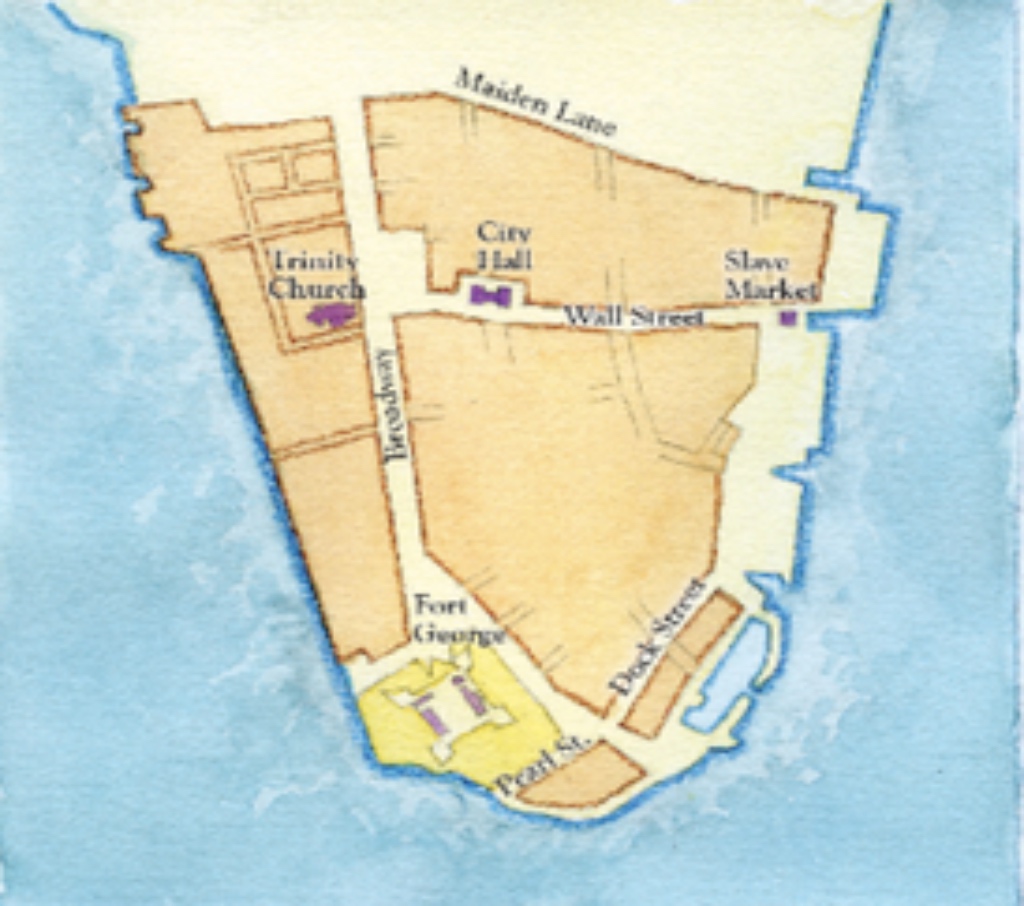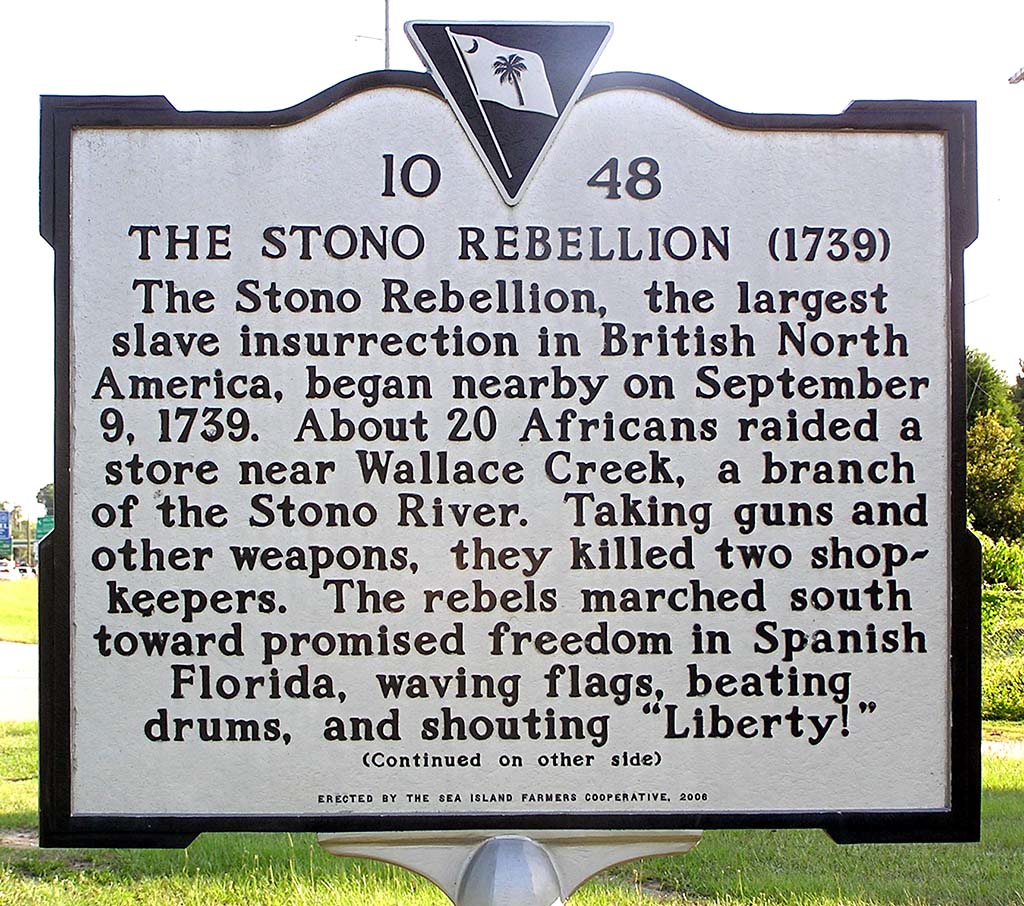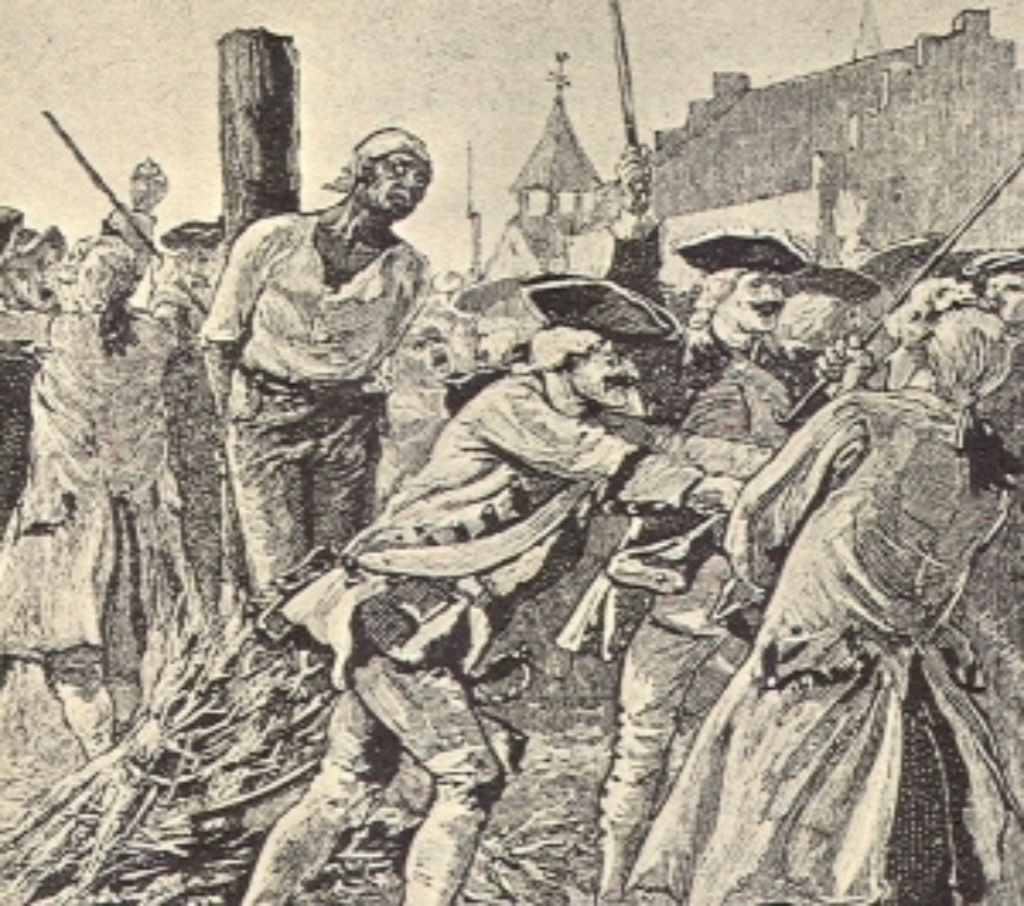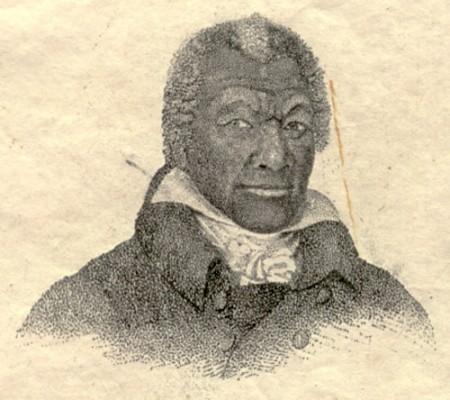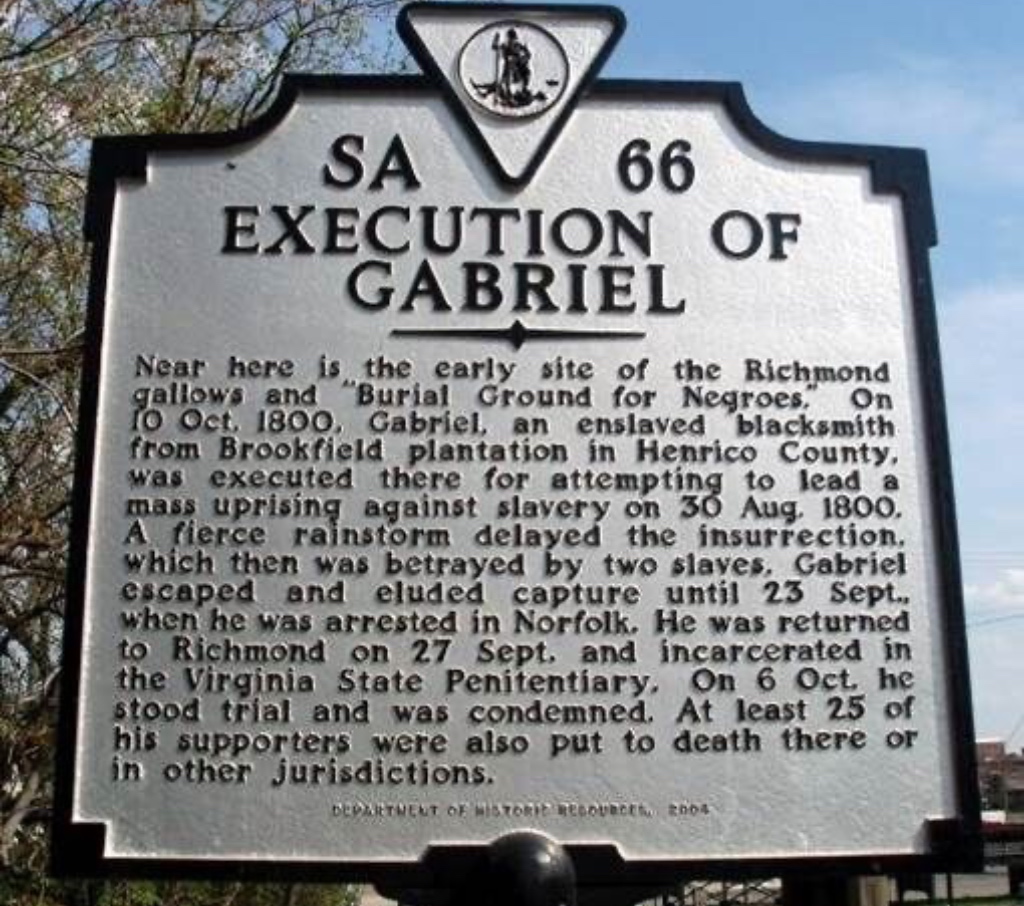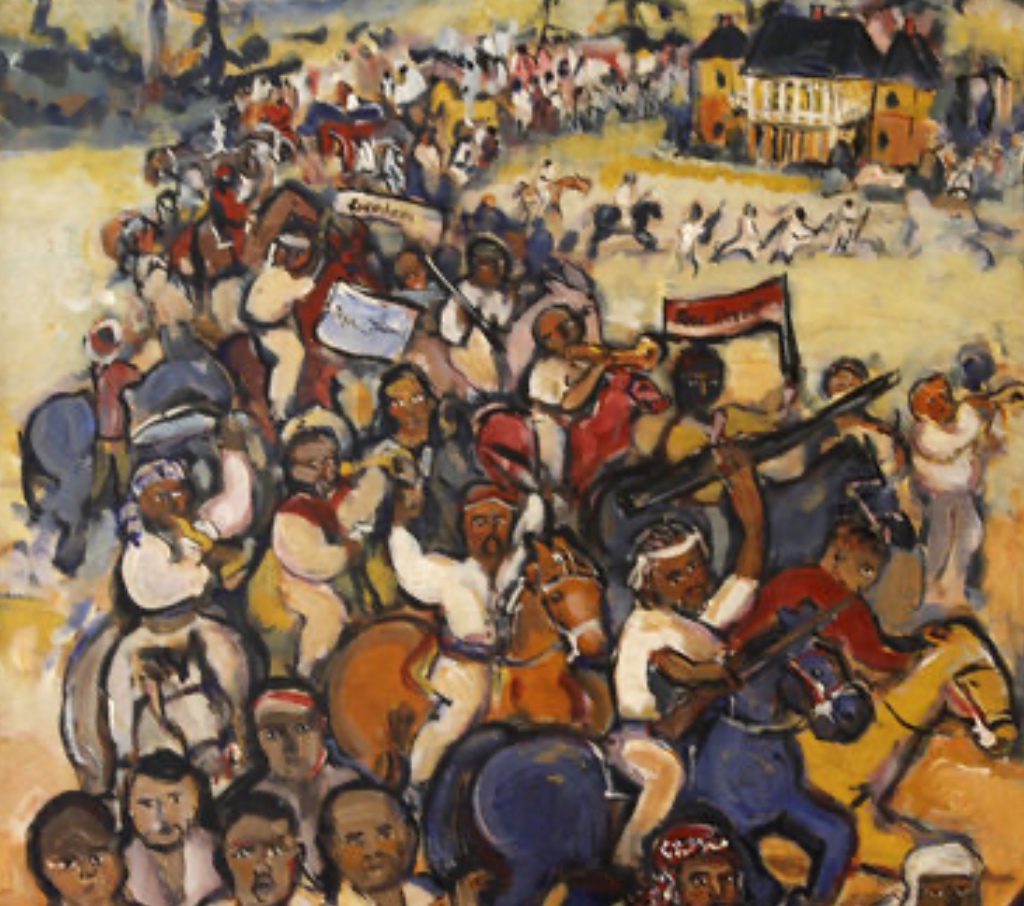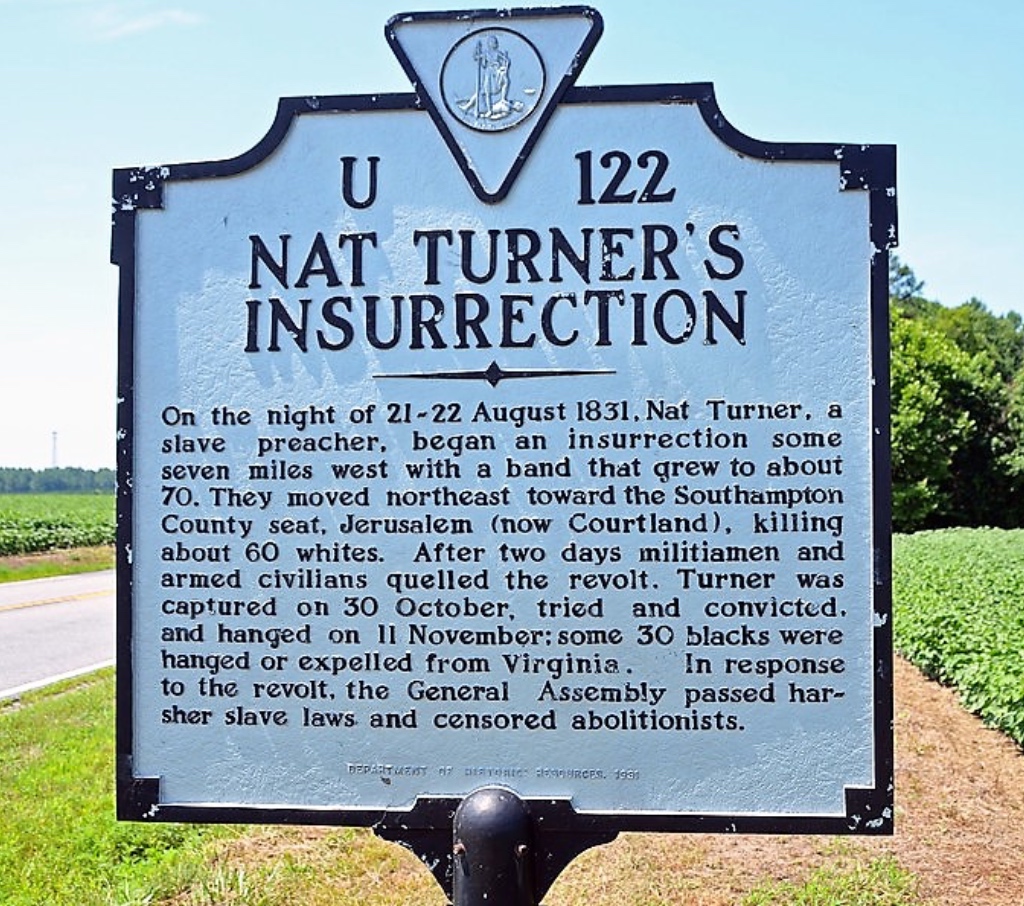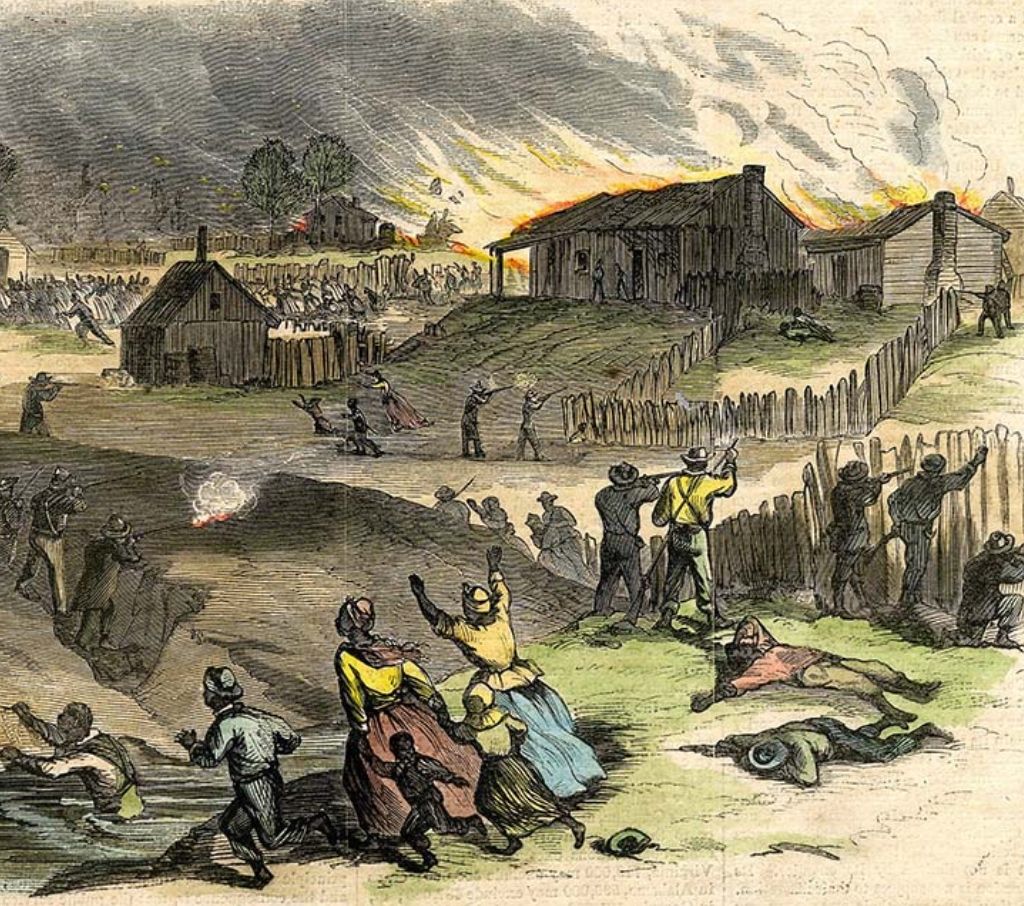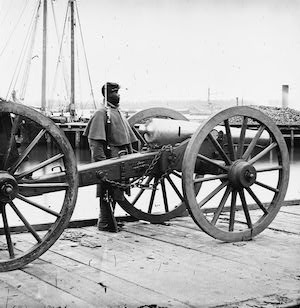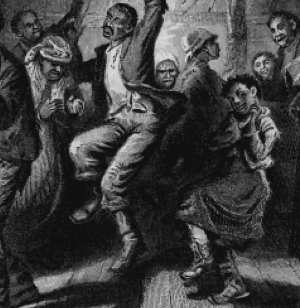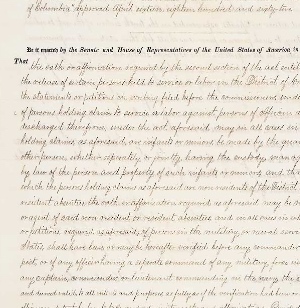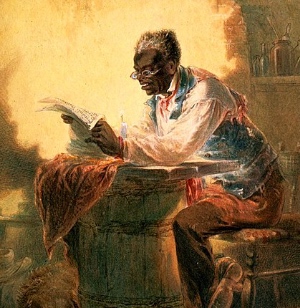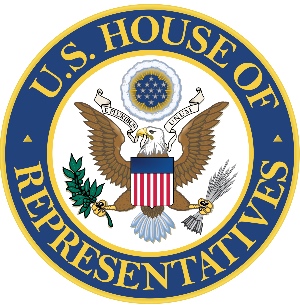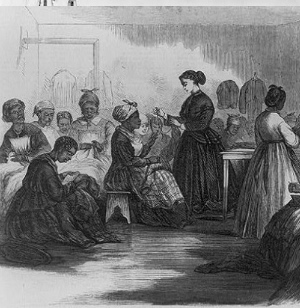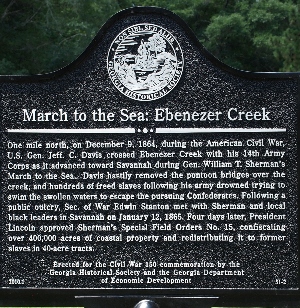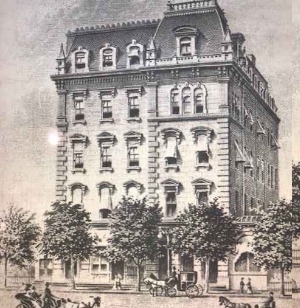In Congress, July 4, 1776, the DOI expresses the ideals on which the U.S.A was founded and the reasons for separation from Great Britain. Abraham Lincoln called it “a rebuke and a stumbling-block to tyranny and oppression.” The DOI inspires people around the world to fight for freedom and equality.
Drafted in 1787 after victory in the War for Independence, the Constitution united its citizens as members of a whole, vesting the power of the union in the people. Without it, the American Experiment might have ended as quickly as it had begun. The Constitution defines the framework of the Federal Government of the United States.
On September 25, 1789, the First Congress of the United States proposed 12 amendments to the Constitution which only 10 were initially selected. The Bill of Rights is the first 10 amendments to the Constitution. It defines citizens’ and states’ rights in relation to the Government.
The Thirteenth Amendment—passed by the Senate on April 8, 1864; by the House on January 31, 1865; and ratified by the states on December 6, 1865—abolished slavery “within the United States, or any place subject to their jurisdiction.” Congress required former Confederate states to ratify the Thirteenth Amendment as a condition of regaining federal representation.
Ratified July 9, 1868, the Fourteenth Amendment granted citizenship to all persons "born or naturalized in the United States," including former enslaved persons, and provided all citizens with “equal protection under the laws,” extending the provisions of the Bill of Rights to the states.
As a member of the Senate Committee on the Judiciary, William Stewart of Nevada guided the Fifteenth Amendment through the Senate. Ratified February 3, 1870, the amendment prohibited states from disenfranchising voters “on account of race, color, or previous condition of servitude.”
As America’s Civil War raged, with the enslavement of millions of people hanging in the balance, African Americans didn’t just sit on the sidelines. Whether enslaved, escaped or
born free, many sought to actively affect the outcome.
President Abraham Lincoln signed a bill ending slavery in the District of Columbia. Passage of this law came 8 1/2 months before President Lincoln issued his Emancipation Proclamation. The act brought to a conclusion decades of agitation aimed at ending what antislavery advocates called "the national shame" of slavery in the nation's capital.
On July 12, 1862, Congress passed a supplemental bill to the original DC Emancipation Act which covered another type of claim, allowing slaves whose masters had not filed for compensation to do so.
President Abraham Lincoln issued the Emancipation Proclamation as the nation approached its third year of bloody civil war. The proclamation declared "that all persons held as slaves" within the rebellious states "are, and henceforward shall be free."
The Select Committee on Slavery and Freedmen was established on January 13, 1864 to deal with issues relating to the subjects listed in its name: slavery and freedmen.
Congress passed “An Act to establish a Bureau for the Relief of Freedmen and Refugees” to provide food, shelter, clothing, medical services, and land to displaced Southerners, including newly freed African Americans. The Freedmen’s Bureau was to operate “during the present war of rebellion, and for one year thereafter,” and also established schools, supervised contracts between freedmen and employers, and managed confiscated or abandoned lands. The battle to establish the Freedmen’s Bureau, and then to extend the legislation one year later, was a major factor in the struggle between President Andrew Johnson and Radical Republicans in Congress over Reconstruction and the role of the federal government in integrating four million newly emancipated African Americans into the political life of the nation.
During the Civil War (1861-65), Union general William T. Sherman issued his Special Field Order No. 15, which confiscated as Union property a strip of coastline
stretching from Charleston, South Carolina, to the St. John’s River in Florida, including Georgia’s Sea Islands and
the mainland thirty miles in from the coast. The order redistributed the roughly 400,000 acres of land to newly freed Black families in forty-acre segments.
Freedmen’s Bank, in full Freedmen’s Savings and Trust Company, bank chartered by the U.S. Congress in March 1865 to provide a place for former slaves to safely store their money. After several successful years in which
freedmen deposited more than $57 million in the bank, it collapsed in 1874 as a result of mismanagement and fraud. The bank’s failure not only robbed many African Americans of their savings but also had a severe
psychological impact on them, causing many to give up hopes and dreams that went along with their savings and bringing about a general distrust of financial institutions for years to come.
The committee was established on December 6, 1865, with the mandate that "so much of the President's message as relates to freedmen shall be referred; and all reports and papers concerning freedmen shall be referred to them, with the liberty to report by bill or otherwise."
More information is on the way. Fill out form and share.
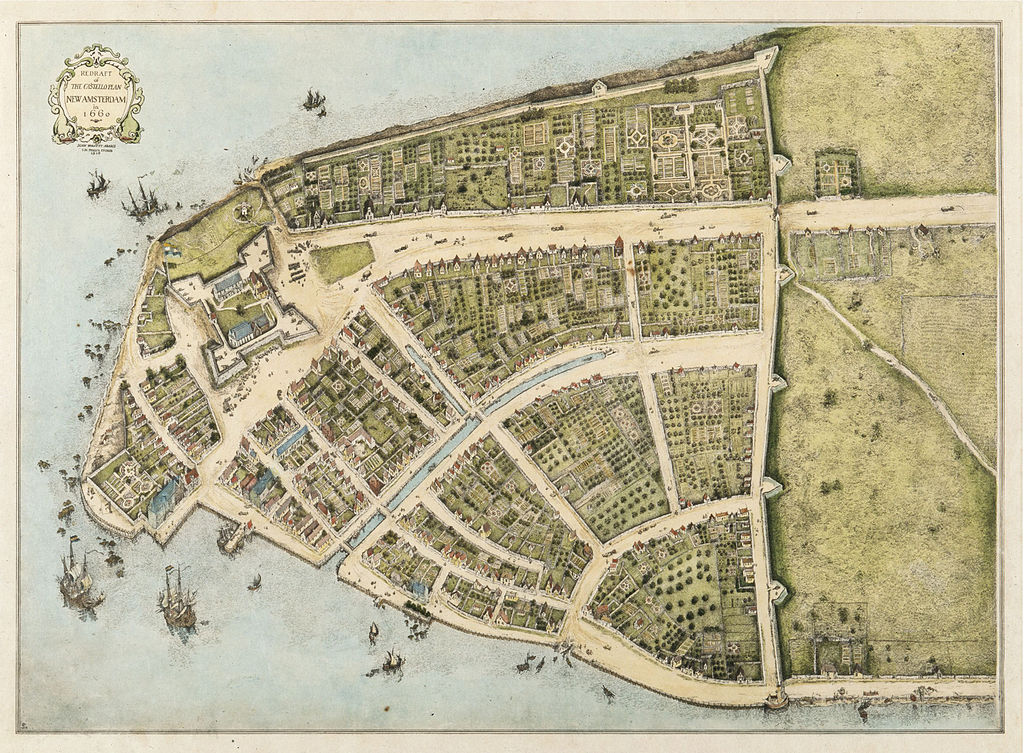
New York slave rebellion of 1712, a violent insurrection of slaves in New York City that resulted in brutal executions and the enactment of harsher slave codes.
The population of New York City in 1712 numbered between
6,000 and 8,000 people, of whom approximately 1,000 were slaves. Unlike Southern plantations, where groups of slaves were relatively isolated from one another, the slaves in New York City were in frequent contact with
each other, even if owned by different people.
The rebellion of 1712 was instigated by African-born slaves, who used the tenets of African-based religion to encourage other slaves to revolt, calling for a war
on Christians. On the night of April 6, 1712, a group of slaves set fire to an outhouse at the home of Peter Van Tilburgh (Van Tilborough, Vantilbourgh) on Maiden Lane at what was then the northern edge of Manhattan.
The fire was a signal to other slaves to begin the revolt. When the white people came out of their homes, they were confronted by a band of 23 slaves (though some sources say there were anywhere from 50 to 100) standing
in front of the burning house, armed with guns, axes, and knives. The slaves fired into the crowd of whites, causing panic. Some people ran to the Battery (a fortification on the lower tip of Manhattan) to alert New
York’s governor, Robert Hunter, who sent the militia to deal with the rioters. Upon seeing the armed soldiers, the rioting slaves ran north toward a wooded swamp.
The soldiers, along with armed bystanders, swept
the city for the rioters, capturing many of them near present-day Canal Street. Nine whites were killed in the riot, and six were wounded. Rather than await trial and certain incarceration (or worse), six slaves committed
suicide. Of the approximately 40 slaves brought to trial, 18 were acquitted and a few others were pardoned. The rest were brutally executed: four were burned alive; one was crushed by a wheel; one was kept in chains
until he starved to death; a pregnant woman was kept alive until she gave birth and was then executed; and the others were hanged. In response to that slave rebellion, strict codes were enacted, which included—but were
not limited to—harsher punishments as the slaveholders saw fit, decreased contact among slaves, and the prohibition of slave-owned firearms.
Reference: Britannica, The Editors of Encyclopaedia. "New York slave rebellion of 1712". Encyclopedia Britannica, 30 Mar. 2021, https://www.britannica.com/event/New-York-slave-rebellion-of-1712. Accessed 11
January 2022
a.k.a. Hutchinson’s Rebellion
The Stono Rebellion was the largest slave revolt ever staged in the 13 colonies. On Sunday, Sept. 9, 1739, a day free of labor, about 20 slaves under the leadership of a man named Jemmy provided whites with a painful lesson on the African desire for liberty. Many members of the group were seasoned soldiers, either from the Yamasee War or from their experience in their homes in Angola, where they were captured and sold, and had been trained in the use of weapons. They gathered at the Stono River and raided a warehouse-like store, Hutchenson’s, executing the white owners and placing their victims’ heads on the store’s front steps for all to see. They moved on to other houses in the area, killing the occupants and burning the structures, marching through the colony toward St. Augustine, Fla., where under Spanish law, they would be free.As the march proceeded, not all slaves joined the insurrection; in fact, some hung back and actually helped hide their masters. But many were drawn to it, and the insurrectionists soon numbered about 100. They paraded down King’s Highway, according to sources, carrying banners and shouting, “Liberty!” — lukango in their native Kikongo, a word that would have expressed the English ideals embodied in liberty and, perhaps, salvation.The slaves fought off the English for more than a week before the colonists rallied and killed most of the rebels, although some very likely reached Fort Mose. Even after Colonial forces crushed the Stono uprising, outbreaks occurred, including the very next year, when South Carolina executed at least 50 additional rebel slaves.
a.k.a. The Great Negro Plot of 1741
New York slave rebellion of 1741, also called New York Conspiracy of 1741 or the Great Negro Plot of 1741, a supposed large-scale scheme plotted by Black
slaves and poor white settlers to burn down and take over New York City. Possibly fueled by paranoia, the city’s white population became convinced that
a major rebellion was being planned. After a witch-hunt-like series of trials, no specific plot was ever uncovered.
The details of the events that took place in New York City in the spring and summer of 1741 are
recorded in numerous historic and later accounts, many of which contain contradictory information. According to nearly all accounts, a fire on March 18, 1741, at Fort George—then Lieutenant Governor George Clarke’s
home—was the first in a series of fires in the city that may or may not have been set by slaves. The fires occurred at regular intervals and then with increased frequency until April 6, when four fires were set in a
single day. Rumors raced across the city when a witness claimed to have seen a Black man, identified as a slave named Cuffee, running from the scene of one of the fires. A month or so earlier that year, in a seemingly
unrelated incident, three slaves had robbed a small store owned by a white couple, Robert and Rebecca Hogg. One of the slaves, Caesar, had brought his booty to a dockside tavern owned by John Hughson, who
was known for dealing in stolen goods from slaves and for selling them alcohol. His tavern had a reputation as a meeting point for the city’s deviants.
Caesar and one of his partners in crime, a slave named Prince, were arrested. When it came time to investigate the fires, Daniel Horsmanden, a judge who was appointed to lead the investigation and preside
over the robbery trials, was eager to uncover a plot and its perpetrators and therefore connected the fires to the burglary.
The notion of a conspiracy was
brewing. Meanwhile overseas, England had been at war for the previous two years with Spain, inciting a fear of Spanish attack on New York City and a general
sentiment of anti-Catholicism. Causing widespread suspicion was a group of Black Spaniards who had been free citizens of Spain until they were captured by the British in the Caribbean and sold into slavery
when they reached Manhattan in 1740. Harbouring resentment, the Spaniards continued to declare themselves free and that, when captured, they should have become “prisoners of war,” not slaves. Thus, Roman Catholics,
African-born slaves, and Spanish-born Blacks were all under suspicion.A jury was impaneled on April 21, and Mary Burton, a young indentured servant at Hughson’s tavern, was brought to testify before the jury.
Under duress, Burton testified that three slaves—Caesar, Prince, and Cuffee—along with a contingent of poor white settlers, had plotted
to burn the fort and the city and kill its inhabitants. Burton also implicated a white prostitute named Peggy Kerry, who had ties to Caesar. Kerry was then forced to testify and implicated many Blacks in the
conspiracy, and, on the basis of her testimony, those named were kept in custody. Those held in custody were also forced to provide testimony and name names, which they did.
In May Caesar and Prince were
charged not with conspiracy but with burglary and were hanged. Kerry (who was pregnant with Caesar’s child), Hughson, and his wife were arrested next and were publicly executed in June. Hughson’s body (and possibly
those of his wife and Kerry as well) was left hanging for all to observe. Still desperate to uncover a plot, Horsmanden offered rewards (of varying amounts, depending on the informant’s skin colour and status)
to anyone who would provide evidence of a conspiracy. Over the course of the three-month investigation, some 150 people were arrested and “confessed” or testified. Burton continued her accusations throughout
the summer, eventually accusing more than 20 white people, including a Latin teacher named John Ury who was accused of using his Catholic faith to influence the rebellion. By the end of summer, the
hysteria had died down and the accusations stopped.As a result of the rumours, false confessions, and finger-pointing, approximately 30 Blacks and 4 whites (the Hughsons, Kerry, and Ury) were executed,
and some 80 more people, mostly Black but some white, were exiled. A journal written by Horsmanden in 1744 served as an important primary source on the proceedings of the 1741 conspiracy, revealing important
details and offering valuable insight into the context in which the trials took place. In the 21st century, historians of the event
were wary of Horsmanden’s factual accuracy, as his book was likely published as justification for his actions, and they remained agnostic about
the actuality of a slave conspiracy.
Reference: Britannica, The Editors of Encyclopaedia. "New York slave rebellion of 1741". Encyclopedia Britannica, 26 Sep. 2020, https://www.britannica.com/event/New-York-slave-rebellion-of-1741. Accessed 1 January 2021.
By Edward Ayres
Only 50 years after the defeat of the British at Yorktown, most Americans had already forgotten the extensive role black people had played on both sides during the War for Independence. At the 1876 Centennial Celebration of the Revolution in Philadelphia, not a single speaker acknowledged the contributions of African Americans in establishing the nation. Yet by 1783, thousands of Black Americans had become involved in the war. Many were active participants, some won their freedom and others were victims, but throughout the struggle Blacks refused to be mere bystanders and gave their loyalty to the side that seemed to offer the best prospect for freedom. By 1775 more than a half-million African Americans, most of them enslaved, were living in the 13 colonies. Early in the 18th century a few New England ministers and conscientious Quakers, such as George Keith and John Woolman, had questioned the morality of slavery but they were largely ignored. By the 1760s, however, as the colonists began to speak out against British tyranny, more Americans pointed out the obvious contradiction between advocating liberty and owning slaves. In 1774 Abigail Adams wrote, “it always appeared a most iniquitous scheme to me to fight ourselves for what we are daily robbing and plundering from those who have as good a right to freedom as we have.” Widespread talk of liberty gave thousands of slaves high expectations, and many were ready to fight for a democratic revolution that might offer them freedom. In 1775 at least 10 to 15 black soldiers, including some slaves, fought against the British at the battles of Lexington and Bunker Hill. Two of these men, Salem Poor and Peter Salem, earned special distinction for their bravery. By 1776, however, it had become clear that the revolutionary rhetoric of the founding fathers did not include enslaved Blacks. The Declaration of Independence promised liberty for all men but failed to put an end to slavery; and although they had proved themselves in battle, the Continental Congress adopted a policy of excluding Black soldiers from the army. In spite of these discouragements, many free and enslaved African Americans in New England were willing to take up arms against the British. As soon states found it increasingly difficult to fill their enlistment quotas, they began to turn to this untapped pool of manpower. Eventually every state above the Potomac River recruited slaves for military service, usually in exchange for their freedom. By the end of the war from 5,000 to 8,000 Blacks had served the American cause in some capacity, either on the battlefield, behind the lines in noncombatant roles, or on the seas. By 1777 some states began enacting laws that encouraged white owners to give slaves for the army in return for their enlistment bounty, or allowing masters to use slaves as substitutes when they or their sons were drafted. In the South the idea of arming slaves for military service met with such opposition that only free blacks were normally allowed to enlist in the army. Most black soldiers were scattered throughout the Continental Army in integrated infantry regiments, where they were often assigned to support roles as wagoners, cooks, waiters or artisans. Several all-black units, commanded by white officers, also were formed and saw action against the British. Rhode Island’s Black Battalion was established in 1778 when that state was unable to meet its quota for the Continental Army. The legislature agreed to set free slaves who volunteered for the duration of the war, and compensated their owners for their value. This regiment performed bravely throughout the war and was present at Yorktown where an observer noted it was “the most neatly dressed, the best under arms, and the most precise in its maneuvers.”Although the Southern states were reluctant to recruit enslaved African Americans for the army, they had no objections to using free and enslaved blacks as pilots and able-bodied seaman. In Virginia alone, as many as 150 black men, many of them slaves, served in the state navy. After the war, the legislature granted several of these men their freedom as a reward for faithful service. African Americans also served as gunners, sailors on privateers and in the Continental Navy during the Revolution. While the majority of Blacks who contributed to the struggle for independence performed routine jobs, a few, such as James Lafayette, gained renown serving as spies or orderlies for well-known military leaders. Black participation in the Revolution, however, was not limited to supporting the American cause, and either voluntarily or under duress thousands also fought for the British. Enslaved Blacks made their own assessment of the conflict and supported the side that offered the best opportunity to escape bondage. Most British officials were reluctant to arm Blacks, but as early as 1775, Virginia’s royal governor, Lord Dunmore, established an all-Black “Ethiopian Regiment” composed of runaway slaves. By promising them freedom, Dunmore enticed over 800 slaves to escape from “rebel” masters. Whenever they could, enslaved Blacks continued to join him until he was defeated and forced to leave Virginia in 1776. Dunmore’s innovative strategy met with disfavor in England, but to many blacks the British army came to represent liberation.
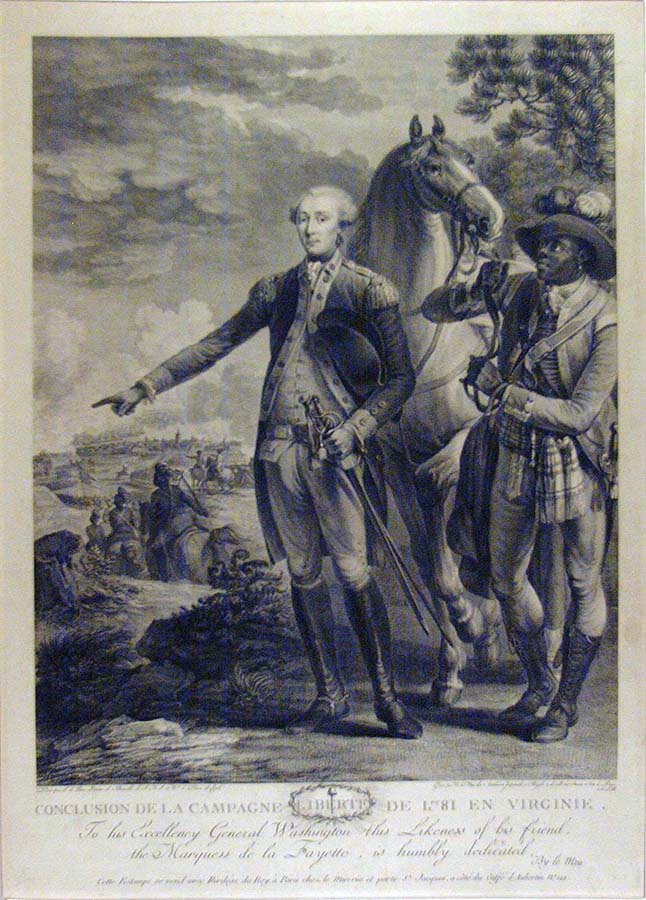
Lafayette, who supported the American cause as a spy, may have been the inspiration for the figure above in the 18th-century
engraving, in the Jamestown-Yorktown collection, depicting the Marquis de Lafayette at Yorktown.
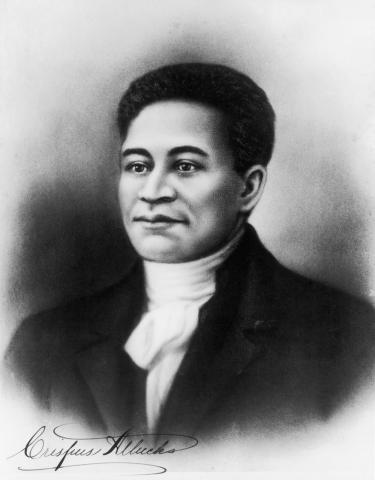
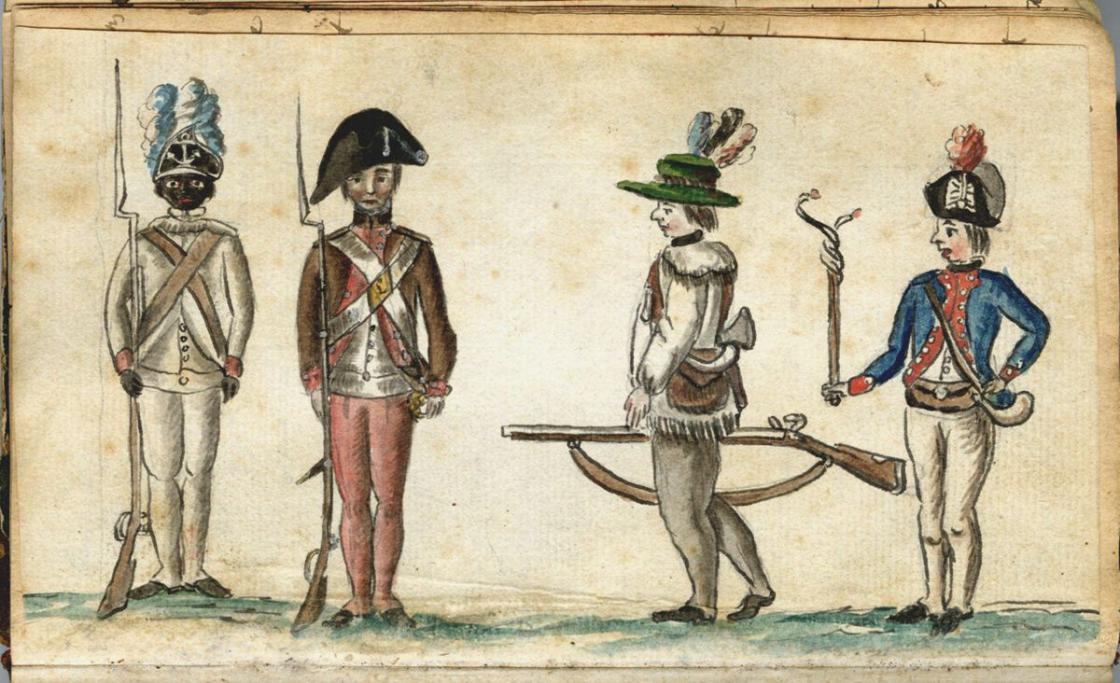
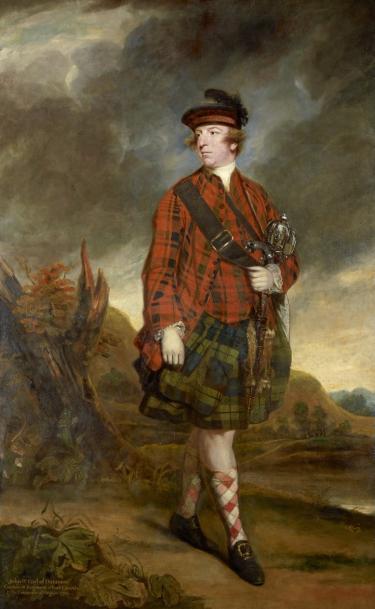
"Death or Liberty"
Freedom or Death!
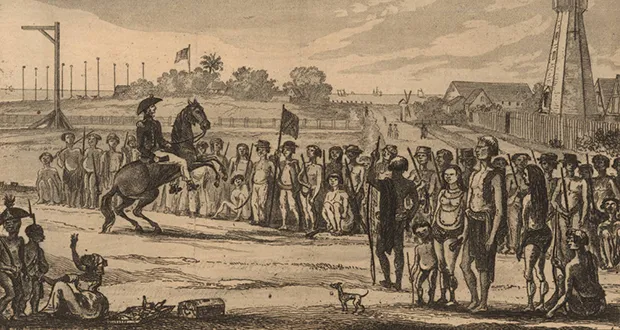
In 1811, about 40 miles north of New Orleans, Charles Deslondes, a mulatto slave driver on the Andry sugar plantation in the German Coast area of Louisiana, took volatile inspiration from that victory seven years prior
in Haiti. He would go on to lead what the young historian Daniel Rasmussen calls the largest and most sophisticated slave revolt in U.S. history in his book American Uprising. (The Stono Rebellion had been the largest
slave revolt on these shores to this point, but that occurred in the colonies, before America won its independence from Great Britain.) After communicating his intentions to slaves on the Andry plantation and in nearby
areas, on the rainy evening of Jan. 8, Deslondes and about 25 slaves rose up and attacked the plantation’s owner and family. They hacked to death one of the owner’s sons, but carelessly allowed the master to escape.
That
was a tactical mistake to be sure, but Deslondes and his men had wisely chosen the well-outfitted Andry plantation — a warehouse for the local militia — as the place to begin their revolt. They ransacked the stores
and seized uniforms, guns and ammunition. As they moved toward New Orleans, intending to capture the city, dozens more men and women joined the cause, singing Creole protest songs while pillaging plantations and murdering
whites. Some estimated that the force ultimately swelled to 300, but it’s unlikely that Deslondes’ army exceeded 124.
The South Carolina congressman, slave master and Indian fighter Wade Hampton was assigned
the task of suppressing the insurrection. With a combined force of about 30 regular U.S. Army soldiers and militia, it would take Hampton two days to stop the rebels. They fought a pitched battle that ended only when
the slaves ran out of ammunition, about 20 miles from New Orleans. In the slaughter that followed, the slaves’ lack of military experience was evident: The whites suffered no casualties, but when the slaves surrendered,
about 20 insurgents lay dead, another 50 became prisoners and the remainder fled into the swamps.
By the end of the month, whites had rounded up another 50 insurgents. In short order, about 100 survivors were
summarily executed, their heads severed and placed along the road to New Orleans. As one planter noted, they looked “like crows sitting on long poles.”
a.k.a Southampton Insurrection
Nat Turner was born on October 2, 1800, in Southampton County, Virginia, the week before Gabriel was hanged. While still a young child, Nat was overheard describing events that had happened before he was born. This, along
with his keen intelligence, and other signs marked him in the eyes of his people as a prophet "intended for some great purpose." A deeply religious man, he "therefore studiously avoided mixing in society, and wrapped
[him]self in mystery, devoting [his] time to fasting and praying."
In 1821, Turner ran away from his overseer, returning after thirty days because of a vision in which the Spirit had told him to "return to the
service of my earthly master." The next year, following the death of his master, Samuel Turner, Nat was sold to Thomas Moore. Three years later, Nat Turner had another vision. He saw lights in the sky and prayed to
find out what they meant. Then "... while laboring in the field, I discovered drops of blood on the corn, as though it were dew from heaven, and I communicated it to many, both white and black, in the neighborhood;
and then I found on the leaves in the woods hieroglyphic characters and numbers, with the forms of men in different attitudes, portrayed in blood, and representing the figures I had seen before in the heavens."
On
May 12, 1828, Turner had his third vision: "I heard a loud noise in the heavens, and the Spirit instantly appeared to me and said the Serpent was loosened, and Christ had laid down the yoke he had borne for the sins
of men, and that I should take it on and fight against the Serpent, for the time was fast approaching when the first should be last and the last should be first... And by signs in the heavens that it would make known
to me when I should commence the great work, and until the first sign appeared I should conceal it from the knowledge of men; and on the appearance of the sign... I should arise and prepare myself and slay my enemies
with their own weapons."
At the beginning of the year 1830, Turner was moved to the home of Joseph Travis, the new husband of Thomas Moore's widow. His official owner was Putnum Moore, still a young child. Turner
described Travis as a kind master, against whom he had no complaints.
Then, in February, 1831, there was an eclipse of the sun. Turner took this to be the sign he had been promised and confided his plan
to the four men he trusted the most, Henry, Hark, Nelson, and Sam. They decided to hold the insurrection on the 4th of July and began planning a strategy. However, they had to postpone action because Turner became ill.
On
August 13, there was an atmospheric disturbance in which the sun appeared bluish-green. This was the final sign, and a week later, on August 21, Turner and six of his men met in the woods to eat a dinner and make their
plans. At 2:00 that morning, they set out to the Travis household, where they killed the entire family as they lay sleeping. They continued on, from house to house, killing all of the white people they encountered.
Turner's force eventually consisted of more than 40 slaves, most on horseback.
By about mid-day on August 22, Turner decided to march toward Jerusalem, the closest town. By then word of the rebellion
had gotten out to the whites; confronted by a group of militia, the rebels scattered, and Turner's force became disorganized. After spending the night near some slave cabins, Turner and his men attempted to attack another
house, but were repulsed. Several of the rebels were captured. The remaining force then met the state and federal troops in final skirmish, in which one slave was killed and many escaped, including Turner. In the end,
the rebels had stabbed, shot and clubbed at least 55 white people to death.
Nat Turner hid in several different places near the Travis farm, but on October 30 was discovered and captured. His "Confession," dictated
to physician Thomas R. Gray, was taken while he was imprisoned in the County Jail. On November 5, Nat Turner was tried in the Southampton County Court and sentenced to execution. He was hanged, and then skinned, on
November 11.
In total, the state executed 55 people, banished many more, and acquitted a few. The state reimbursed the slaveholders for their slaves. But in the hysterical climate that followed the rebellion,
close to 200 black people, many of whom had nothing to do with the rebellion, were murdered by white mobs. In addition, slaves as far away as North Carolina were accused of having a connection with the insurrection,
and were subsequently tried and executed.
The state legislature of Virginia considered abolishing slavery, but in a close vote decided to retain slavery and to support a repressive policy against black
people, slave and free.
Citation: https://www.pbs.org/wgbh/aia/part3/3p1518.html
a.k.a Southampton Insurrection
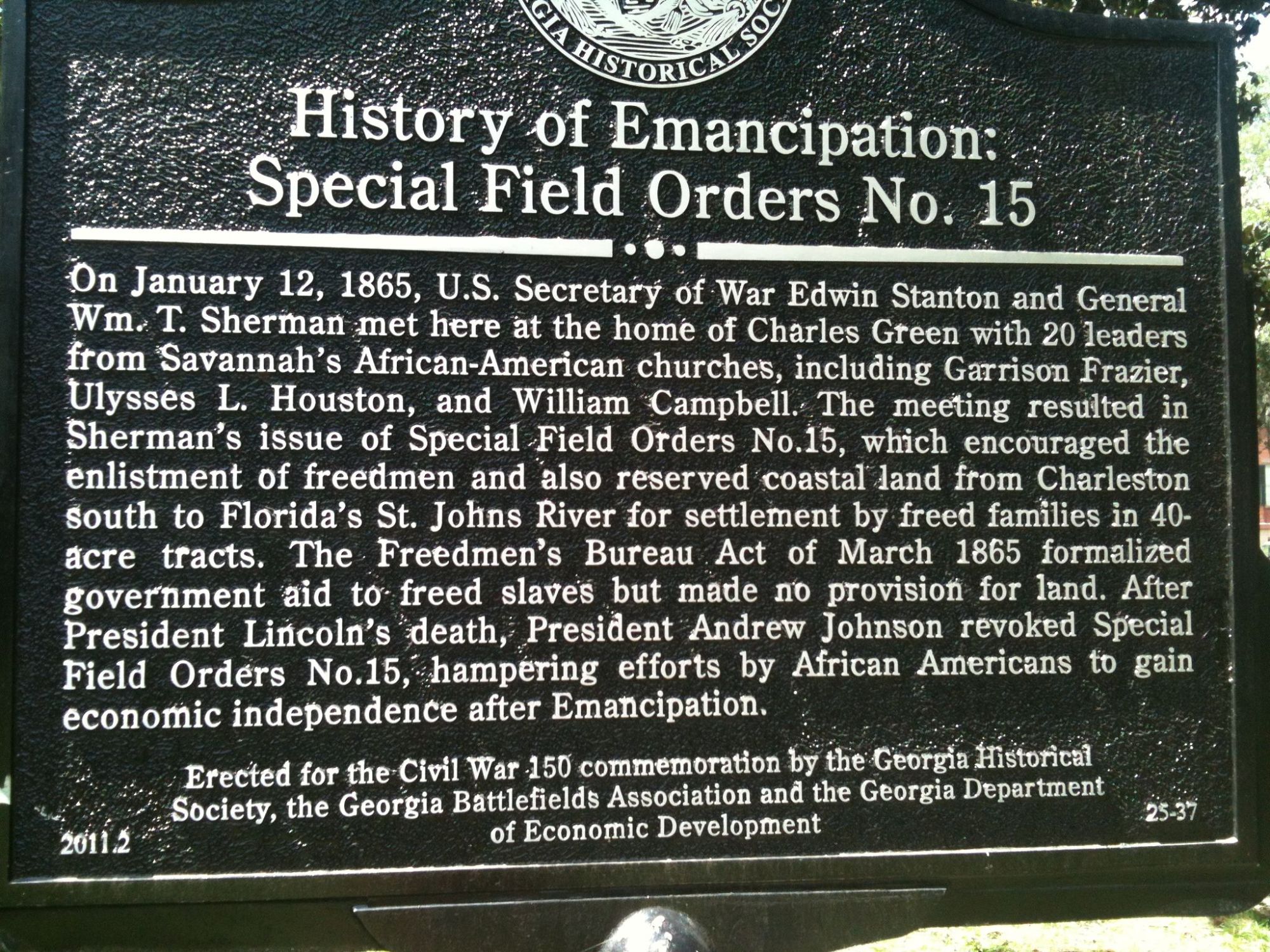
On January 16, 1865, during the Civil War (1861-65), Union general William T. Sherman issued his Special Field Order No. 15, which confiscated as Union property a strip of coastline stretching from Charleston, South Carolina,
to the St. John’s River in Florida, including Georgia’s Sea Islands and the mainland thirty miles in from the coast. The order redistributed the roughly 400,000 acres of land to newly freed Black families in forty-acre
segments.
Sherman’s order came on the heels of his successful March to the Sea from Atlanta to Savannah and just prior to his march northward into South Carolina. Radical Republicans in the U.S. Congress, like
Charles Sumner and Thaddeus Stevens, for some time had pushed for land redistribution in order to break the back of Southern slaveholders’ power. Feeling pressure from within his own party, U.S. president Abraham Lincoln
sent his secretary of war, Edwin M. Stanton, to Savannah in order to facilitate a conversation with Sherman over what to do with Southern planters’ lands.
On January 12 Sherman and Stanton met with twenty Black leaders
of the Savannah community, mostly Baptist and Methodist ministers, to discuss the question of emancipation. Lincoln approved Field Order No. 15 before Sherman issued it just four days after meeting with the Black leaders.
From Sherman’s perspective the most important priority in issuing the directive was military expediency. It served as a means of providing for the thousands of Black refugees who had been following his army since its
invasion of Georgia. He could not afford to support or protect these refugees while on campaign.
The order explicitly called for the settlement of Black families on confiscated land, encouraged freedmen to join
the Union army to help sustain their newly won liberty, and designated a general officer to act as inspector of settlements. Inspector General Rufus Saxton would police the land and work to ensure legal title of the
property for the Black settlers. In a later order, Sherman also authorized the army to loan mules to the newly settled farmers.
Sherman’s radical plan for land redistribution in the South was actually a practical
response to several issues. Although Sherman had never been a racial egalitarian, his land-redistribution order served the military purpose of punishing Confederate planters along the rice coast of the South for their
role in starting the Civil War, while simultaneously solving what he and Radical Republicans viewed as a major new American problem: what to do with a new class of free Southern laborers. Congressional leaders convinced
President Lincoln to establish the Bureau of Refugees, Freedmen, and Abandoned Lands on March 3, 1865, shortly after Sherman issued his order. The Freedmen’s Bureau, as it came to be called, was authorized to give legal
title for forty-acre plots of land to freedmen and white Southern Unionists.
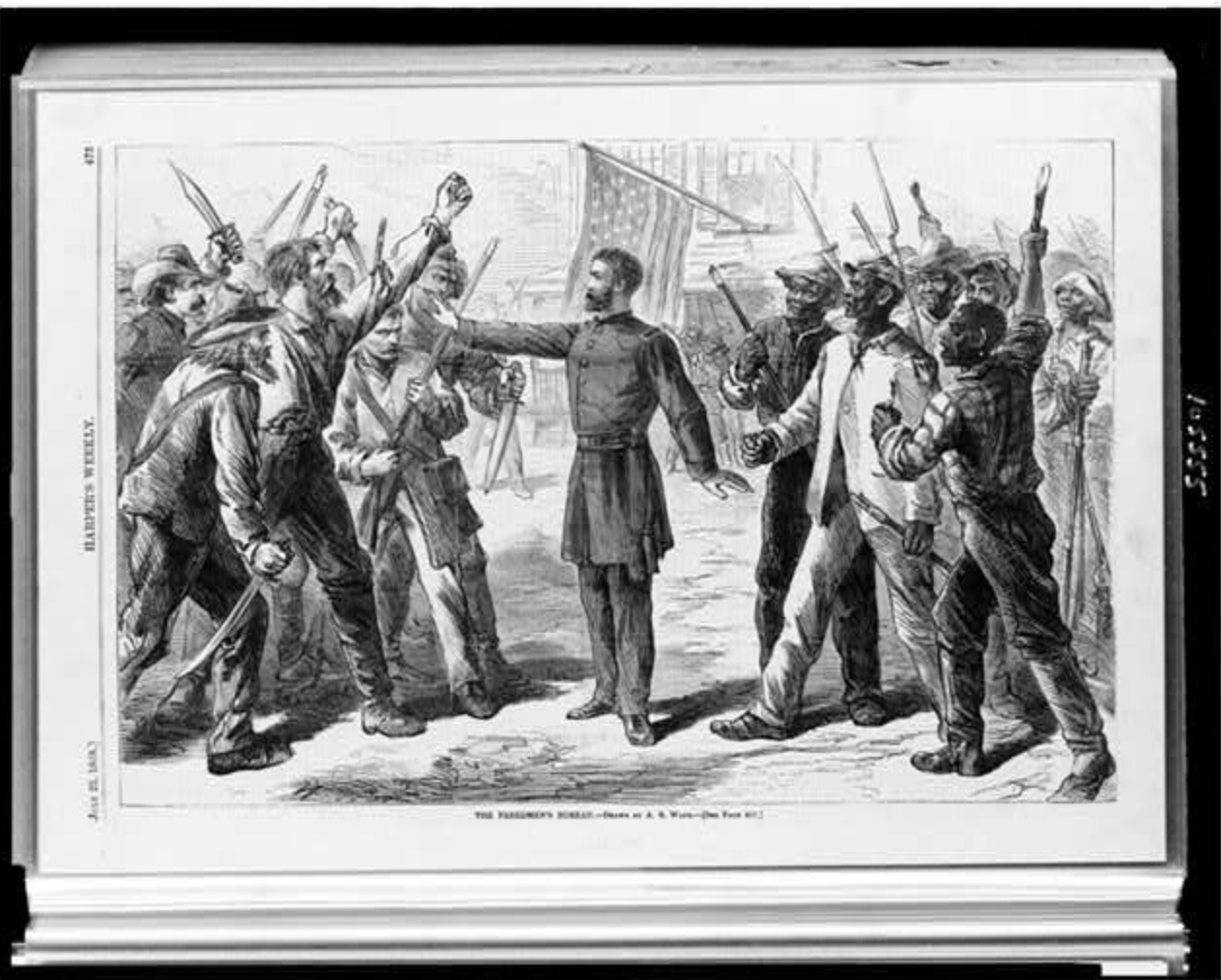
The immediate effect of Sherman’s order provided for the settlement of roughly 40,000 Black Americans (both refugees and locals who had been under Union army administration in the Sea Islands since 1861). This lifted the
burden of supporting the freedpeople from Sherman’s army as it turned north into South Carolina. But the order was a short-lived promise for Blacks. Despite the objections of General Oliver O. Howard, the Freedmen’s
Bureau chief, U.S. president Andrew Johnson overturned Sherman’s directive in the fall of 1865, after the war had ended, and returned most of the land along the South Carolina, Georgia, and Florida coasts to the planters
who had originally owned it.
Although Sherman’s Special Field Order No. 15 had no tangible benefit for Black citizens after President Johnson’s revocation, the present-day movement supporting reparations has pointed
to it as the U.S. government’s promise to make restitution to African Americans for enslavement. The order is also the likely origin of the phrase “forty acres and a mule,” which spread throughout the South in the weeks
and months following Sherman’s march.
By about mid-day on August 22, Turner decided to march toward Jerusalem, the closest town. By then word of the rebellion had gotten out to the whites; confronted by a group
of militia, the rebels scattered, and Turner’s force became disorganized. After spending the night near some slave cabins, Turner and his men attempted to attack another house, but were repulsed. Several of the rebels
were captured. The remaining force then met the state and federal troops in final skirmish, in which one slave was killed and many escaped, including Turner. In the end, the rebels had stabbed, shot and clubbed at least
55 white people to death.
Nat Turner hid in several different places near the Travis farm, but on October 30 was discovered and captured. His “Confession,” dictated to physician Thomas R. Gray, was taken while
he was imprisoned in the County Jail. On November 5, Nat Turner was tried in the Southampton County Court and sentenced to execution. He was hanged, and then skinned, on November 11.
In total, the state executed
55 people, banished many more, and acquitted a few. The state reimbursed the slaveholders for their slaves. But in the hysterical climate that followed the rebellion, close to 200 black people, many of whom had nothing
to do with the rebellion, were murdered by white mobs. In addition, slaves as far away as North Carolina were accused of having a connection with the insurrection, and were subsequently tried and executed.
The
state legislature of Virginia considered abolishing slavery, but in a close vote decided to retain slavery and to support a repressive policy against black people, slave and free.
Citation:
Myers, Barton. "Sherman’s Field Order No. 15." New Georgia Encyclopedia, last modified Sep 30, 2020. https://www.georgiaencyclopedia.org/articles/history-archaeology/shermans-field-order-no-15/
On May 1-2, 1866, Memphis suffered its worst race riot in history. Some forty-six African Americans and two whites died during the riot. A Joint Congressional Committee reported seventy-five persons injured, one hundred
persons robbed, five women raped, ninety-one homes burned, four churches and eight schools burned and destroyed, and seventeen thousand dollars in federal property destroyed. Hundreds of blacks were jailed, and almost
all other freedmen fled town until the disturbance ended. For two days, white mobs, which included policemen, firemen, and some businessmen, attacked the freedmen’s camps and neighborhoods.
The riot started after
an alarm went out that African American soldiers from Fort Pickering, on the south boundary of downtown Memphis, had killed several policemen who tried to arrest a black soldier. In response to the reports, Union General
George Stoneman disarmed the soldiers and locked them in their barracks, leaving nearby freedmen’s settlements vulnerable to the white mobs that soon attacked women, children, and defenseless men, as well as the northern
missionaries who served as ministers and teachers for the freedmen.
The Memphis riots reflected the anger and frustration felt by many white citizens and particularly former Confederates, who had suffered the
agony of a bitter defeat at the hands of a black and white Union army. Irish immigrants, who had sided with the Confederacy, especially hated the freedmen who dominated the skilled and unskilled jobs that had previously
served as a mechanism for upward mobility in the Irish community. Some downtown businessmen participated in the mob because they resented the hordes of penniless freedmen on the streets. Other rioters wanted revenge
for the Union occupation. The use of African American soldiers as patrolmen with power to order whites to “move on” was especially galling to many. Finally, the riots reflected the attitudes of most white citizens toward
the former slaves who were then free and soon demanding equal rights.
One outcome of the Memphis riot (and a similar riot in New Orleans) was the congressional move toward Radical Reconstruction. The Radical
Republicans passed a Civil Rights Bill and the Fourteenth Amendment, guaranteeing citizenship, equal protection of the laws, and due process to former slaves. Tennessee was forced to ratify the Fourteenth Amendment
before being allowed to return to the Union (July 1866). Paradoxically, the former slaves became citizens, voters, and officeholders in part due to the Reconstruction acts passed in response to the race riots in Memphis
and elsewhere.
Citation Information
The following information is provided for citations.
Article Title Memphis Race Riot of 1866
Author Bobby L. Lovett
Website Name Tennessee Encyclopedia
URL http://tennesseeencyclopedia.net/entries/memphis-race-riot-of-1866/
Access
Date January 11, 2022
Publisher Tennessee Historical Society
Original Published Date October 8, 2017
Date of Last Update March 1, 2018
